Unit 10 If you go to the party, you'll have a great time! Section A Grammar Focus-4c 课件 (共18张PPT)
文档属性
| 名称 | Unit 10 If you go to the party, you'll have a great time! Section A Grammar Focus-4c 课件 (共18张PPT) | 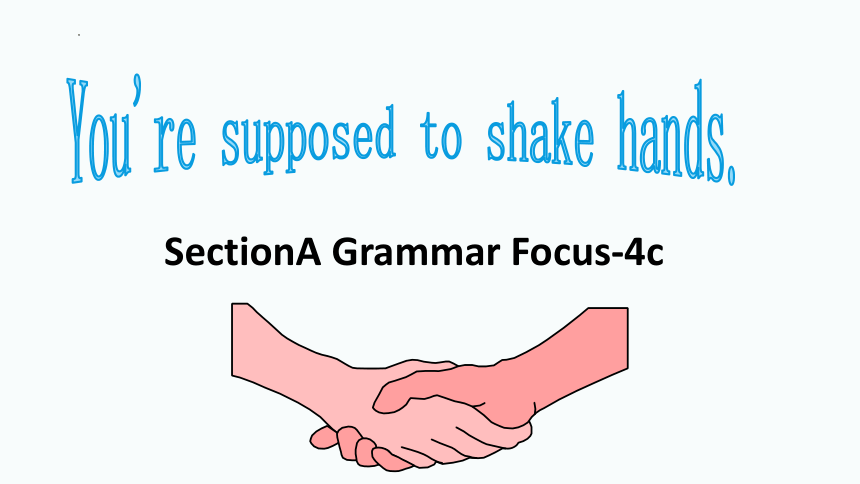 | |
| 格式 | pptx | ||
| 文件大小 | 1.8MB | ||
| 资源类型 | 教案 | ||
| 版本资源 | 人教新目标(Go for it)版 | ||
| 科目 | 英语 | ||
| 更新时间 | 2022-12-06 17:38:14 | ||
图片预览

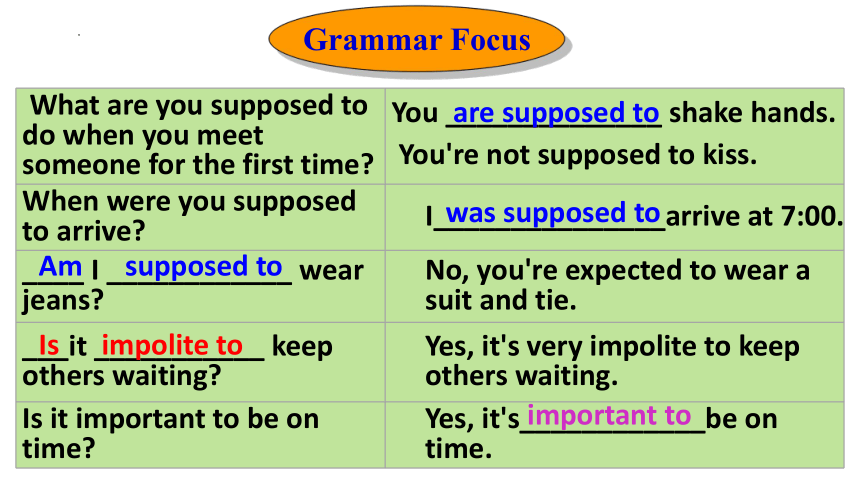
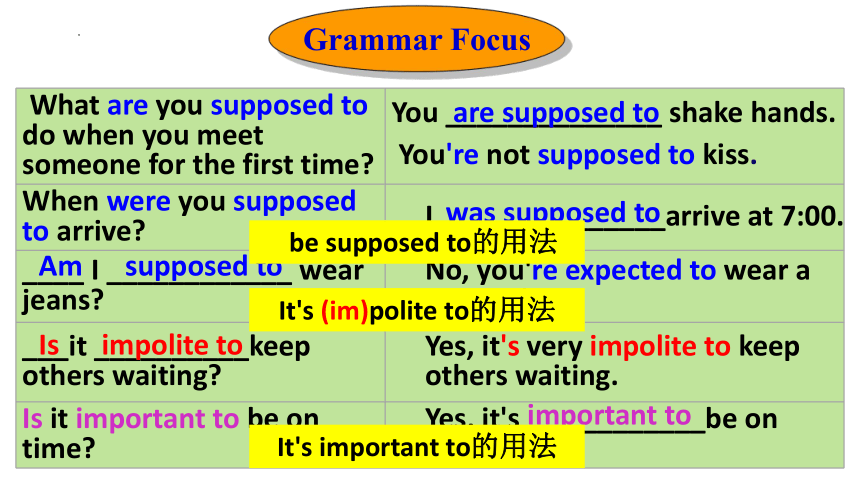
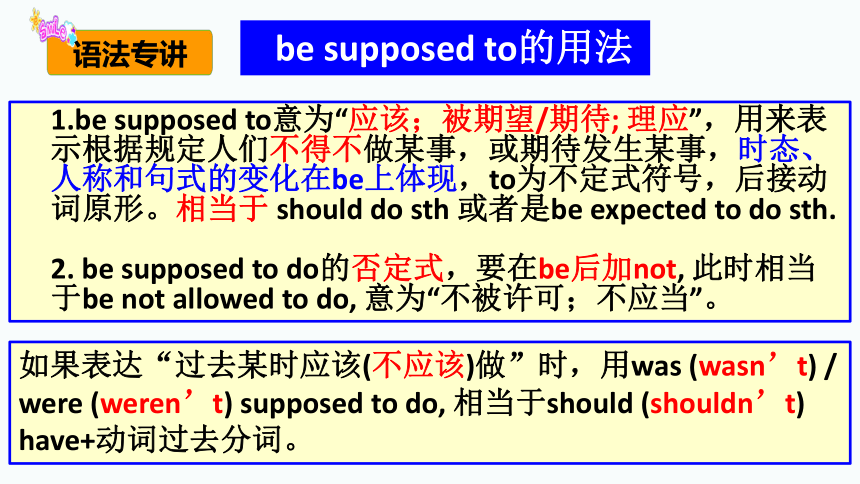
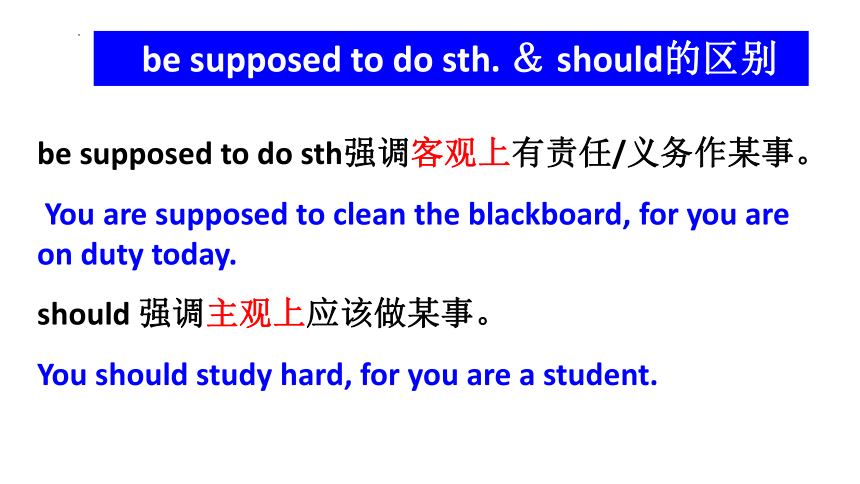
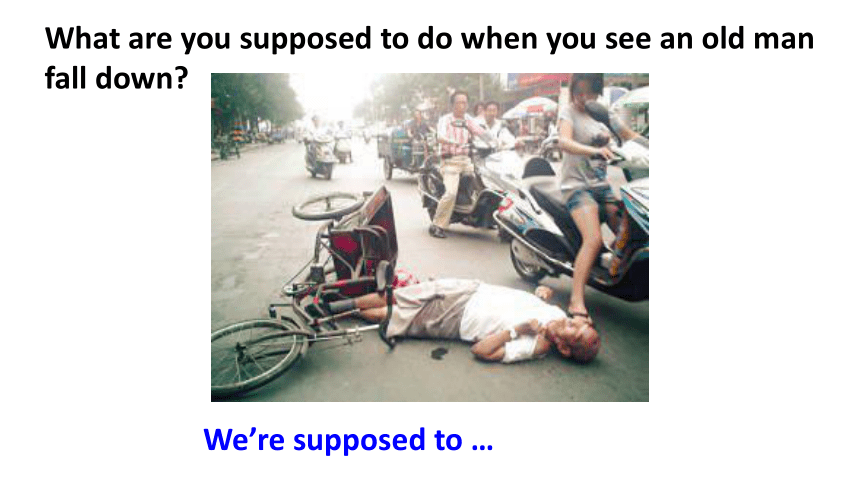
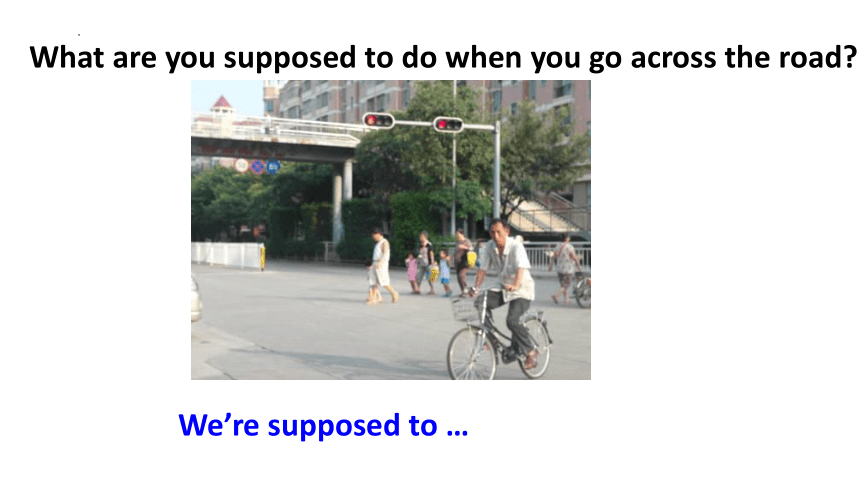
文档简介
(共18张PPT)
You're supposed to shake hands.
SectionA Grammar Focus-4c
What are you supposed to do when you meet someone for the first time You ______________ shake hands.
You're not supposed to kiss.
When were you supposed to arrive I_______________arrive at 7:00.
____ I ____________ wear jeans No, you're expected to wear a suit and tie.
___it ___________ keep others waiting Yes, it's very impolite to keep others waiting.
Is it important to be on time Yes, it's____________be on time.
Grammar Focus
are supposed to
was supposed to
Is impolite to
Am supposed to
important to
What are you supposed to do when you meet someone for the first time You ______________ shake hands.
You're not supposed to kiss.
When were you supposed to arrive I_______________arrive at 7:00.
____ I ____________ wear jeans No, you're expected to wear a suit and tie.
___it __________keep others waiting Yes, it's very impolite to keep others waiting.
Is it important to be on time Yes, it's____________be on time.
Grammar Focus
are supposed to
was supposed to
Is impolite to
Am supposed to
important to
be supposed to的用法
It's (im)polite to的用法
It's important to的用法
be supposed to的用法
语法专讲
1.be supposed to意为“应该;被期望/期待; 理应”,用来表示根据规定人们不得不做某事,或期待发生某事,时态、人称和句式的变化在be上体现,to为不定式符号,后接动词原形。相当于 should do sth 或者是be expected to do sth.
2. be supposed to do的否定式,要在be后加not, 此时相当于be not allowed to do, 意为“不被许可;不应当”。
如果表达“过去某时应该(不应该)做”时,用was (wasn’t) / were (weren’t) supposed to do, 相当于should (shouldn’t) have+动词过去分词。
be supposed to do sth强调客观上有责任/义务作某事。
You are supposed to clean the blackboard, for you are on duty today.
should 强调主观上应该做某事。
You should study hard, for you are a student.
be supposed to do sth. & should的区别
What are you supposed to do when you see an old man fall down
We’re supposed to …
What are you supposed to do when you go across the road
We’re supposed to …
What are you supposed to do when you see a thief stealing someone’s wallet
We’re supposed to …
What are you supposed to do when someone asks you for help
We’re supposed to …
When you go abroad, it ___________ ___bring your
passport.
2. After class, students ______________________ clean the
chalk off the blackboard.
3. If you visit the northern coast of Norway during the
winter season, it ______________pack warm clothes.
4. If there are people in the meeting room, you__________
___________ knock before entering.
5. In many eastern European countries, you ____________
take off your gloves before shaking hands.
Complete the sentences with the phrases in the box. be supposed to be expected to be important to
is important to
are supposed\expected to
is important to
are supposed
\expected to
4a
are supposed
\expected to
1.knock作不及物动词,相关短语:knock at/on 敲,
knock against 与……相撞,knock down/off 撞倒。
2.take off “脱下(衣服)”,与put on意思相反。
“(飞机等)起飞”,与land意思相反。
Fill in the blanks with the correct forms of
the words in brackets.
4b
Each country has different rules about social situations. A traveler ___________________ (not expect; know) all of these, but it is helpful _______ (learn) as many of these customs as possible. One of the best ways to be accepted in a foreign country is to try _____________ (understand) how people think. Learning what you ________________ (suppose; do) and _________________ (not suppose; do) in social situations may be difficult, but it is worth the trouble if you want to
understand another culture.
isn’t expected to know
to learn
to understand
are supposed to do
not supposed to do
worth adj.值得;有……价值(的)
1.be worth doing值得做。
eg:The book is well worth reading.
这本书很值得一读。
2.be worth+钱 意为“值多少钱”。
eg:The painting is worth 3,000 yuan.
这幅画值3000元。
3. be worth+名词 意为“值得…”。
eg:I think it's worth our work.
我认为这事值得我们付出劳动。
it is worth the trouble
这是值得的
Make a list of advice for someone coming to your country as an exchange student for the first time. Work with your group to give advice about:
★ time ★ what to do for someone’s birthday
★ meeting people ★ visiting someone’s home
★ table manners ★ giving gifts
always on time or little earlier
festival gifts being necessary
call first, and knock at the door
say, “Ni Hao, …” with a smile
giving birthday gifts
older people eating first
4c
Self Check
1. In many countries, it is impolite to show up at someone’s house for the first time with ______ hands. You should always bring a small gift.
2. Billy was very uncomfortable at a fine-dining restaurant last night because he didn’t know _____ table manners.
3. It is _____ spending the time to learn about the customs of a country before you go there. That way, you will know what you are supposed to do in different situations.
4. The ______ is always the worst in the ______ city. It is important to leave earlier if you are traveling by car.
5. Sandy went into her sister’s room without ________ on the door. That made her sister ____.
worth capital basic traffic empty mad knocking
empty
basic
worth
traffic
capital
knocking
mad
精细餐厅;美食餐厅
Self Check
1. Fill in the blanks with the words in the box.
2. Think about your culture and make statements.
In my culture, when you_______________________________
you’re supposed to _______________________________
you’re not supposed to ________________________________
you’re expected to ____________________________________
it’s impolite to _______________________________________
it’s important to _____________________________________
are having meal in someone’s home .
allow the elderly to start eating first.
stick your chopsticks into a bowl of rice.
keep your mouth closed when you are chewing.
reach across the table to pick certain foods.
ask for permission to leave the table early.
一、根据汉语提示完成句子
1.青少年应该敢于质疑。
Teenagers are ________ ______ be brave enough to
ask questions.
2.怀特先生匆匆赶往机场,因为他的班
机9点起飞。
Mr.White hurried to the airport,for his plane would
________ ________ at 9 o‘clock.
3.我哥哥过去常常在周六去钓鱼。
My brother ________ ________ go fishing on Saturdays.
supposed to
take off
used to
4. 这些短信很无聊,不值得回复。
These short messages are so boring that they
______ ______ _______ ________ _____.
5.令我惊讶的是,他已经收到那所大学校
长的来信了。
________ my surprise,he has already ________ from the principal of the university.
are not worth replying to
To
heard
You're supposed to shake hands.
SectionA Grammar Focus-4c
What are you supposed to do when you meet someone for the first time You ______________ shake hands.
You're not supposed to kiss.
When were you supposed to arrive I_______________arrive at 7:00.
____ I ____________ wear jeans No, you're expected to wear a suit and tie.
___it ___________ keep others waiting Yes, it's very impolite to keep others waiting.
Is it important to be on time Yes, it's____________be on time.
Grammar Focus
are supposed to
was supposed to
Is impolite to
Am supposed to
important to
What are you supposed to do when you meet someone for the first time You ______________ shake hands.
You're not supposed to kiss.
When were you supposed to arrive I_______________arrive at 7:00.
____ I ____________ wear jeans No, you're expected to wear a suit and tie.
___it __________keep others waiting Yes, it's very impolite to keep others waiting.
Is it important to be on time Yes, it's____________be on time.
Grammar Focus
are supposed to
was supposed to
Is impolite to
Am supposed to
important to
be supposed to的用法
It's (im)polite to的用法
It's important to的用法
be supposed to的用法
语法专讲
1.be supposed to意为“应该;被期望/期待; 理应”,用来表示根据规定人们不得不做某事,或期待发生某事,时态、人称和句式的变化在be上体现,to为不定式符号,后接动词原形。相当于 should do sth 或者是be expected to do sth.
2. be supposed to do的否定式,要在be后加not, 此时相当于be not allowed to do, 意为“不被许可;不应当”。
如果表达“过去某时应该(不应该)做”时,用was (wasn’t) / were (weren’t) supposed to do, 相当于should (shouldn’t) have+动词过去分词。
be supposed to do sth强调客观上有责任/义务作某事。
You are supposed to clean the blackboard, for you are on duty today.
should 强调主观上应该做某事。
You should study hard, for you are a student.
be supposed to do sth. & should的区别
What are you supposed to do when you see an old man fall down
We’re supposed to …
What are you supposed to do when you go across the road
We’re supposed to …
What are you supposed to do when you see a thief stealing someone’s wallet
We’re supposed to …
What are you supposed to do when someone asks you for help
We’re supposed to …
When you go abroad, it ___________ ___bring your
passport.
2. After class, students ______________________ clean the
chalk off the blackboard.
3. If you visit the northern coast of Norway during the
winter season, it ______________pack warm clothes.
4. If there are people in the meeting room, you__________
___________ knock before entering.
5. In many eastern European countries, you ____________
take off your gloves before shaking hands.
Complete the sentences with the phrases in the box. be supposed to be expected to be important to
is important to
are supposed\expected to
is important to
are supposed
\expected to
4a
are supposed
\expected to
1.knock作不及物动词,相关短语:knock at/on 敲,
knock against 与……相撞,knock down/off 撞倒。
2.take off “脱下(衣服)”,与put on意思相反。
“(飞机等)起飞”,与land意思相反。
Fill in the blanks with the correct forms of
the words in brackets.
4b
Each country has different rules about social situations. A traveler ___________________ (not expect; know) all of these, but it is helpful _______ (learn) as many of these customs as possible. One of the best ways to be accepted in a foreign country is to try _____________ (understand) how people think. Learning what you ________________ (suppose; do) and _________________ (not suppose; do) in social situations may be difficult, but it is worth the trouble if you want to
understand another culture.
isn’t expected to know
to learn
to understand
are supposed to do
not supposed to do
worth adj.值得;有……价值(的)
1.be worth doing值得做。
eg:The book is well worth reading.
这本书很值得一读。
2.be worth+钱 意为“值多少钱”。
eg:The painting is worth 3,000 yuan.
这幅画值3000元。
3. be worth+名词 意为“值得…”。
eg:I think it's worth our work.
我认为这事值得我们付出劳动。
it is worth the trouble
这是值得的
Make a list of advice for someone coming to your country as an exchange student for the first time. Work with your group to give advice about:
★ time ★ what to do for someone’s birthday
★ meeting people ★ visiting someone’s home
★ table manners ★ giving gifts
always on time or little earlier
festival gifts being necessary
call first, and knock at the door
say, “Ni Hao, …” with a smile
giving birthday gifts
older people eating first
4c
Self Check
1. In many countries, it is impolite to show up at someone’s house for the first time with ______ hands. You should always bring a small gift.
2. Billy was very uncomfortable at a fine-dining restaurant last night because he didn’t know _____ table manners.
3. It is _____ spending the time to learn about the customs of a country before you go there. That way, you will know what you are supposed to do in different situations.
4. The ______ is always the worst in the ______ city. It is important to leave earlier if you are traveling by car.
5. Sandy went into her sister’s room without ________ on the door. That made her sister ____.
worth capital basic traffic empty mad knocking
empty
basic
worth
traffic
capital
knocking
mad
精细餐厅;美食餐厅
Self Check
1. Fill in the blanks with the words in the box.
2. Think about your culture and make statements.
In my culture, when you_______________________________
you’re supposed to _______________________________
you’re not supposed to ________________________________
you’re expected to ____________________________________
it’s impolite to _______________________________________
it’s important to _____________________________________
are having meal in someone’s home .
allow the elderly to start eating first.
stick your chopsticks into a bowl of rice.
keep your mouth closed when you are chewing.
reach across the table to pick certain foods.
ask for permission to leave the table early.
一、根据汉语提示完成句子
1.青少年应该敢于质疑。
Teenagers are ________ ______ be brave enough to
ask questions.
2.怀特先生匆匆赶往机场,因为他的班
机9点起飞。
Mr.White hurried to the airport,for his plane would
________ ________ at 9 o‘clock.
3.我哥哥过去常常在周六去钓鱼。
My brother ________ ________ go fishing on Saturdays.
supposed to
take off
used to
4. 这些短信很无聊,不值得回复。
These short messages are so boring that they
______ ______ _______ ________ _____.
5.令我惊讶的是,他已经收到那所大学校
长的来信了。
________ my surprise,he has already ________ from the principal of the university.
are not worth replying to
To
heard
同课章节目录
- Unit 1 Where did you go on vacation?
- Section A
- Section B
- Unit 2 How often do you exercise?
- Section A
- Section B
- Unit 3 I'm more outgoing than my sister.
- Section A
- Section B
- Unit 4 What's the best movie theater?
- Section A
- Section B
- Unit 5 Do you want to watch a game show?
- Section A
- Section B
- Unit 6 I'm going to study computer science.
- Section A
- Section B
- Unit 7 Will people have robots?
- Section A
- Section B
- Unit 8 How do you make a banana milk shake?
- Section A
- Section B
- Unit 9 Can you come to my party?
- Section A
- Section B
- Unit 10 If you go to the party, you'll have a grea
- Section A
- Section B
